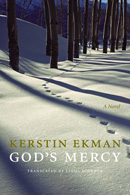

Univ. of Nebraska/Bison Books, paperback, 9780803224582
With make-believe snow swirling around my head and imaginary wolves howling in the distance, I am reminded of Russian novels. Not only is the weather brutal in this Swedish tale, but like the Russians, these characters often have multiple names: a given name, a nickname, sometimes an alias. That's as it should be in a story about shifting identities in a world where cultures collide.
This first volume in the "Wolfskin" trilogy by Kerstin Ekman is set largely in the early 20th century, although it spans several generations, from 1916 to the present day. This is not a linear tale, but rather a layering of the memories and experiences of three primary characters who slowly unravel the facts.
Hillevi is the most clearly defined of the characters. Driven by personal determination and a desire to
follow her fiancé, she defies her foster parents' wishes by taking a job as a midwife in the farflung
rural hinterlands of northern Sweden. At twenty‒five, Hillevi has firm convictions about the powers of
modern medicine, in defiance of the beliefs of the nomadic Lapps and their village neighbors. But when
she skis through driving snow to an isolated hut to deliver the child of thirteen-year-old Serine, against
the wishes of the girl's uncle, Hillevi is stunned by what she finds:
Hillevi saves the girl but not the baby, an unnecessary loss born of mutual misunderstanding that will color the remainder of Hillevi's days. Although she will make her life here, experiencing both love and change, she will never entirely abandon the attitude that, "They are not like us."
We also see the story through the eyes of Serine's cousin Elis, an artistic teenager who fathered and tried to save Serine's baby, but then runs away from home to avoid murder at the hands of his grandfather.
The third point-of-view character is Risten, who will eventually become Hillevi's foster child. Although Hillevi saves Risten from a merciless life of poverty, she also robs her of a culture that the girl yearns to rediscover. Although Risten's origin is never entirely clear, her ongoing first-person narration provides the sense of history that makes this tale so rich and ultimately so cohesive.
Although the story is a dense and twisted tapestry of family connections that are rarely what they seem, the
reading is pure pleasure, with language as clear and sharp as a bell. Ultimately, each character must choose
a culture and a people to belong to, and those choices are astonishingly difficult in this web of tribe,
training and custom. At the end of this first volume, although we are not left without resolution, we can't
help wondering, "What's next?"